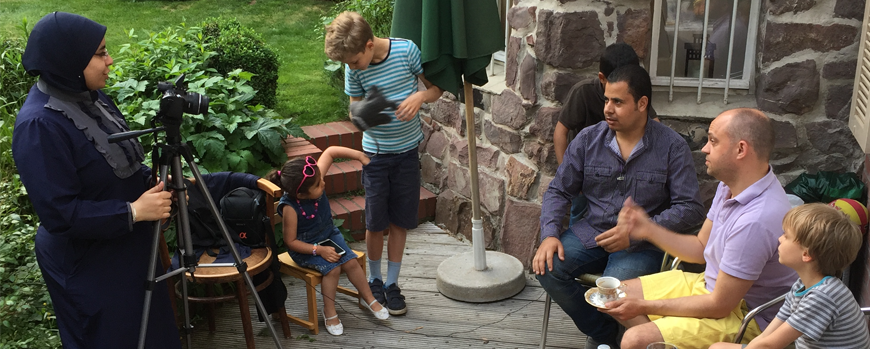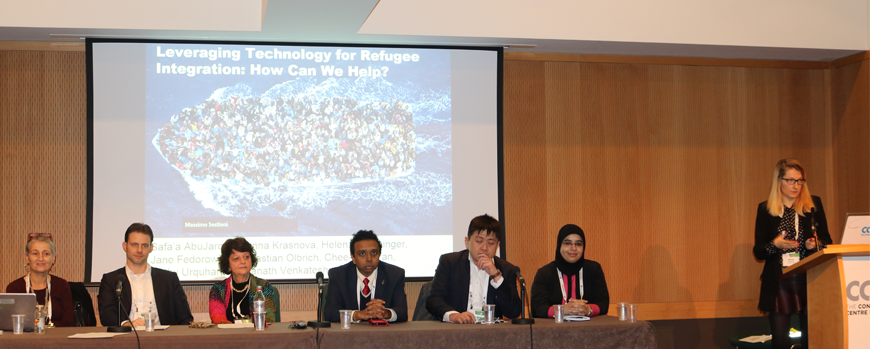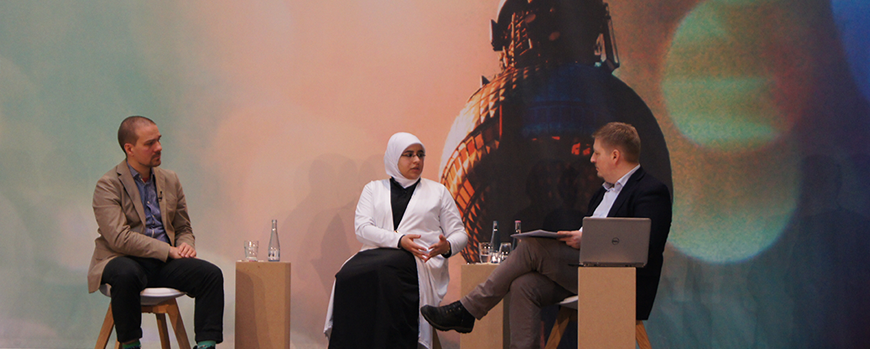Digital Integration: The Role of Technology in Social Inclusion of Refugees in Germany
Responsible Researchers: Safa'a AbuJarour, Prof. Dr. Hanna Krasnova
Having the number of refugees around the world reaching disastrous proportions, there is a growing pressure to understand which measures are effective in promoting social inclusion of refugees in their new homes. Indeed, the current refugees’ crisis in Europe is distinguished by the high usage of technology by refugees, in particular smartphones and Social Media. Therefore, there is a growing hope in the power of Social Media and other Information and Communication Technologies (ICTs) in supporting integration processes. This observation sparked us to analyze this case aiming at deriving best practices and learnings that can be generalized and applied in other comparable situations leading to social inclusion and human well-being. Therefore, we started the project “Digital Integration” since March 2016.
In this research topic, we have been applying research methods to investigate the use of ICT by the refugees in Germany. In particular, our ongoing research revolves around investigating the chances and challenges of smartphones and Social Media use by refugees with the goal of utilizing them to get integrated into the new hosting societies, and how ICT systems should be designed and culturally adapted to help the integration process and the social inclusion of the refugees.
Safa’a AbuJarour believes that ICT can play a crucial role in the integration process of the refugees, and she believes that the value of science and research is tackling current issues and coming up with innovative solutions to them following research methods. Her goal is to employ research to come up with a scientific approach to interconnect the newcomers and locals’ society and bridge the gap between both cultures, which will support the integration process.
Contributing to this research project, we have conducted an empirical study, in which we ran interviews with refugees in Berlin and Brandenburg. In this study, we found out that the following four areas of ICT deployment are especially relevant to refugees’ integration: (1) communication with the government; (2) social connectedness: connections to family and friends back home; (3) participation in educational programs; and (4) integration and social inclusion. These key findings of this study reveal the contribution of ICTs used by the refugees to the processes of integration and social inclusion into the host country. From the practical standpoint, these findings provide actionable recommendations for policy-makers and different stockholders, including industry partners, governmental offices, NGO members in their efforts to achieve integration.
These insights have been published in the panel paper “Leveraging Technology for Refugee Integration: How Can We Help” and discussed in a panel discussion that was organized at International Conference of Information Systems (ICIS) 2016 in Dublin (AbuJarour et al., 2016: http://aisel.aisnet.org/cgi/viewcontent.cgi?article=1319&context=icis2016).
Falling Walls Lab
In order to raise the awareness on the topic, Safa’a has participated at the event Falling Walls Lab 2016, for which has been selected among more than 2400 innovators and leaders over the world to present her breakthrough on “Breaking the Wall of Social Exclusion of Refugees”.
Also in the context of our project “Digital Integration”, Safa’a AbuJarour has been invited to the Live Debate “Integration 4.0” by the Friedrich-Ebert-Stiftung in Berlin in the context of their upcoming Integration Congress 2017. She has shared her insights from her research about the link between the use of smartphones and Social Networks by refugees and integration, and what could be done to increase the chances of integration for both parties; newcomers as well as local population. The entire live interview is available under the link: http://www.sagwas.net/live/integrationskongress-iiii-mit-dem-smartphone-nach-europa/
Main Areas
At the Chair of Social Media and Data Science, and in the context of the “Digital Integration” project, Prof. Hanna Krasnova and Safa’a AbuJarour offer the students the possibility to work on the following subprojects:
1. Technology and Refugees, in which we investigate:
- … the usage of Social Media and smartphones by refugees
- … the effect of technology on social inclusion of the refugees.
2. Stories of Refugees, in which we aim to:
- … spread the positive image about the refugees in Germany
- … show their success stories to motivate the integration process
Examples of our Student's Projects
Refugees and Smartphones: Smart Integration – Winter Semester 2016/2017
Damir Harbas, Verena Mattern, Marcel Rist, and Safa’a AbuJarour
Stories of Refugees - Summer Semester 2016
Farina Hoffmeier, Lena Jung, Marianna Merseburger, and Safa’a AbuJarour
Publications
- AbuJarour, S. Krasnova, H., Wenninger, H., Fedorowicz, J., Tan, C.-W., Urquhart, C. and Venkatesh, V. (2016). “Leveraging Technology for Refugee Integration: How Can We Help?” Panel Paper, International Conference on Information Systems (ICIS 2016), Dublin, Ireland.
Projects
- AbuJarour, Safa’a (2016). “Breaking the Wall of Social Exclusion of Refugees,” Falling Walls Lab, Berlin-Germany, 08.11.2016, URL: https://www.youtube.com/watch?v=QxWg4_jNpy8
- Al Haddad, K. (2016). "Stories of the Refugees,” Social Media Campaign Master Project.
- Harbas, D., Mattern, V. and Rist, M. (2016) "Refugees and Smartphones,” Social Media Campaign Master Project.
- Golze, K., Heiden, A. and Saccomano, M. (2016). “Technology helps Refugees,” Social Media Campaign Bachelor Project
- Chamorro, C. and Sorgato, K. (2016). "Refugees in Germany: Legal and Ethical Issues on Social Media,” Seminar Paper.
- Fischl, C., Harbas, D. and Kuper, S. (2016). "Apps for Refugee Integration: What is Missing?” Seminar Paper.
- Hoffmeier, F., Jung and L., Merseburger, M., AbuJarour, S. and Krasnova, H. (2016). "Who are the Refugees?” Social Media Campaign Master Project.
Social Media Campaign: Who are the Refugees?
Website: whoaretherefugees.wordpress.com
YouTube: https://www.youtube.com/channel/UCN8D46z-scGq6B3ldFvo1rw



